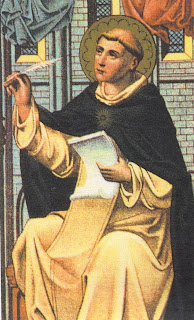Saint Thomas Aquinas, also known as Thomas of Aquin, is an italian Dominican priest and a doctor of the church. He is known as the Angelic Doctor and the Universal Doctor.
Thomas Aquinas was born in Aquino circa 1225, and is related to the Hohenstaufen dynasty of Holy Roman Emperors by virtue of his mother. At the age of five, he was educated at Monte Cassino and was later enrolled by his parents into a newly-established university in Naples. At the latter, he was introduced to the teachings of famous philosophers, such as Aristotle and Maimonides. These teachings would go on to influence his theological philosophies in his later life.
At nineteen, Thomas Aquinas decided to become a Dominican priest. His parents were against the idea and locked him away, but he spent his two-year detention teaching his younger sisters and communicating with the Dominican Order. Eventually, Thomas got out and went on to the University of Paris for further studies. There he met his would-be mentor, Albertus Magnus.
Not long after, Thomas taught in a new university in Cologne as an apprentice professor, writing and instructing students on the books of the Old Testament. He returned to Paris to obtain his master's degree in theology in 1252. During this time, he wrote even more theological papers about a variety of subjects.
In 1259, Thomas Aquinas went on to Orvieto, where he wrote a new liturgy for the feast of Corpus Christi. In 1265, he was sent to Rome to establish a new university, and it was in Rome that he completed the Summa Theologica, his most famous work. Later on, he was assigned back to the University of Paris as the regent master.
In his final days, it was reported that Thomas Aquinas heard Jesus speaking to him. On his way to the Second Council of Lyon, he struck his head on the branch of a fallen tree and became seriously ill. Eventually, he died on 7 March 1274 while giving a commentary on the Song of Songs.
Thomas Aquinas was pronounced a saint 50 years after his death by Pope John XXII. His teachings have influenced modern-day theology and philosophy, as well as the teachings of the Catholic Church itself. He has been adopted as the patron saint of many tertiary schools, including the National University of Singapore (NUS). His feast day is on January 28.
Sources: Wikipedia, TheSplendoroftheChurch.blogspot.com

